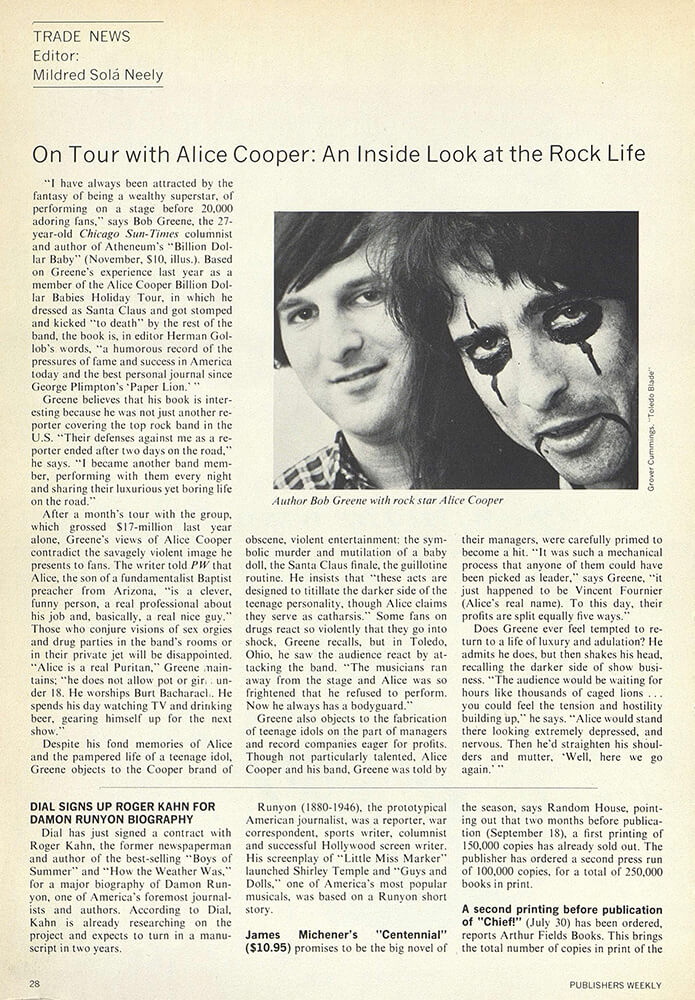Article Database

Publishers Weekly
August 05, 1974
On Tour with Alice Cooper
An Inside Look at the Rock Life
"I have always been attracted by the fantasy of being a wealthy superstar, of performing on a stage before 20,000 adoring fans," says Bob Greene, the 27-year-old Chicago Sun-Times columnist and author of Atheneum's "Billion Dollar Baby" (November, $10, illus.). Based on Greene's experience last year as a member of the Alice Cooper Billion Dollar Babies Holiday Tour, in which he dressed as Santa Claus and got stomped and kicked "to death" by the rest of the band, the book is, in editor Herman Gollob's words, "a humorous record of the pressures of fame and success in America today and the best personal journal since George Plimpton's 'Paper Lion.'"
Greene believes that his book is interesting because he was not just another reporter covering the top rock band in the U.S. "Their defenses against me as a reporter ended after two days on the road," he says. "I became another band member, performing with them every night and sharing their luxurious yet boring life on the road."
After a month's tour with the group, which grossed $17-million last year alone, Greene's views of Alice Cooper contradict the savagely violent image he presents to fans. The writer told PW that Alice, the son of a fundamentalist Baptist preacher from Arizona, "is a clever, funny person, a real professional about his job and, basically, a real nice guy." Those who conjure visions of sex orgies and drug parties in the band's rooms or in their private jet will be disappointed. "Alice is a real Puritan," Greene maintains; "he does not allow pot or girls under 18. He worships Burt Bacharach. He spends his day watching TV and drinking beer, gearing himself up for the next show."
Despite his fond memories of Alice and the pampered life of a teenage idol, Greene objects to the Cooper brand of obscene, violent entertainment: the symbolic murder and mutilation of a baby doll, the Santa Claus finale, the guillotine routine. He insists that "these acts are designed to titillate the darker side of the teenage personality, though Alice claims they serve as catharsis." Some fans on drugs react so violently that they go into shock, Greene recalls, but in Toledo, Ohio, he saw the audience react by attacking the band. "The musicians ran away from the stage and Alice was so frightened that he refused to perform. Now he always has a bodyguard."
Greene also objects to the fabrication of teenage idols on the part of managers and record companies eager for profits. Though not particularly talented, Alice Cooper and his band, Greene was told by their managers, were carefully primed to become a hit. "It was such a mechanical process that anyone of them could have been picked as leader," says Greene, "it just happened to be Vincent Furnier (Alice's real name). To this day, their profits are split equally five ways."
Does Greene ever feel tempted to return to a life of luxury and adulation? He admits he does, but then shakes his head, recalling the darker side of show business. "The audience would be waiting for hours like thousands of caged lions... you could feel the tension and hostility building up," he says. "Alice would stand there looking extremely depressed, and nervous. Then he'd straighten his shoulders and mutter, 'Well, here we go again.'"
(Kindly submitted by Hunter Goatley)



